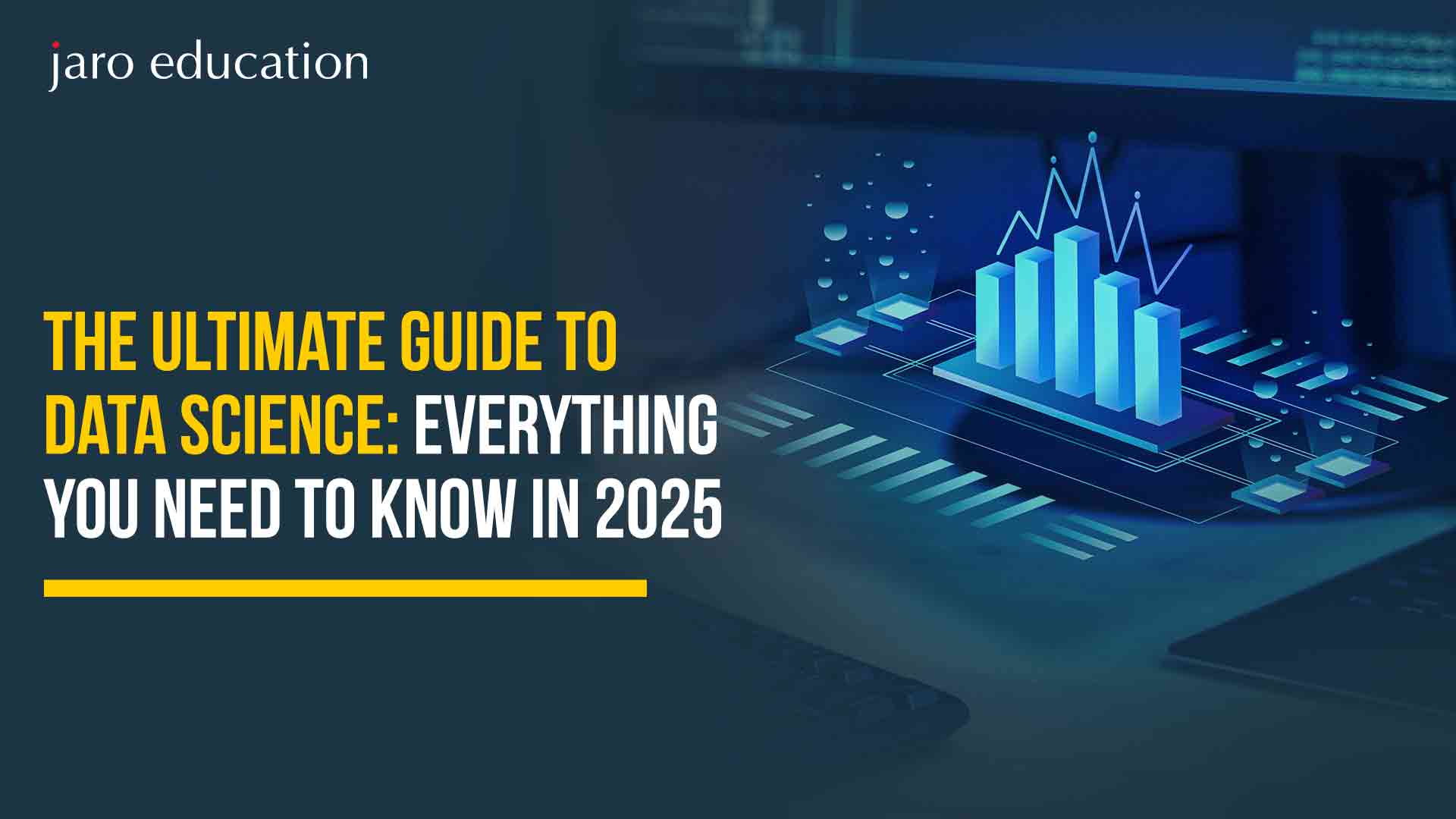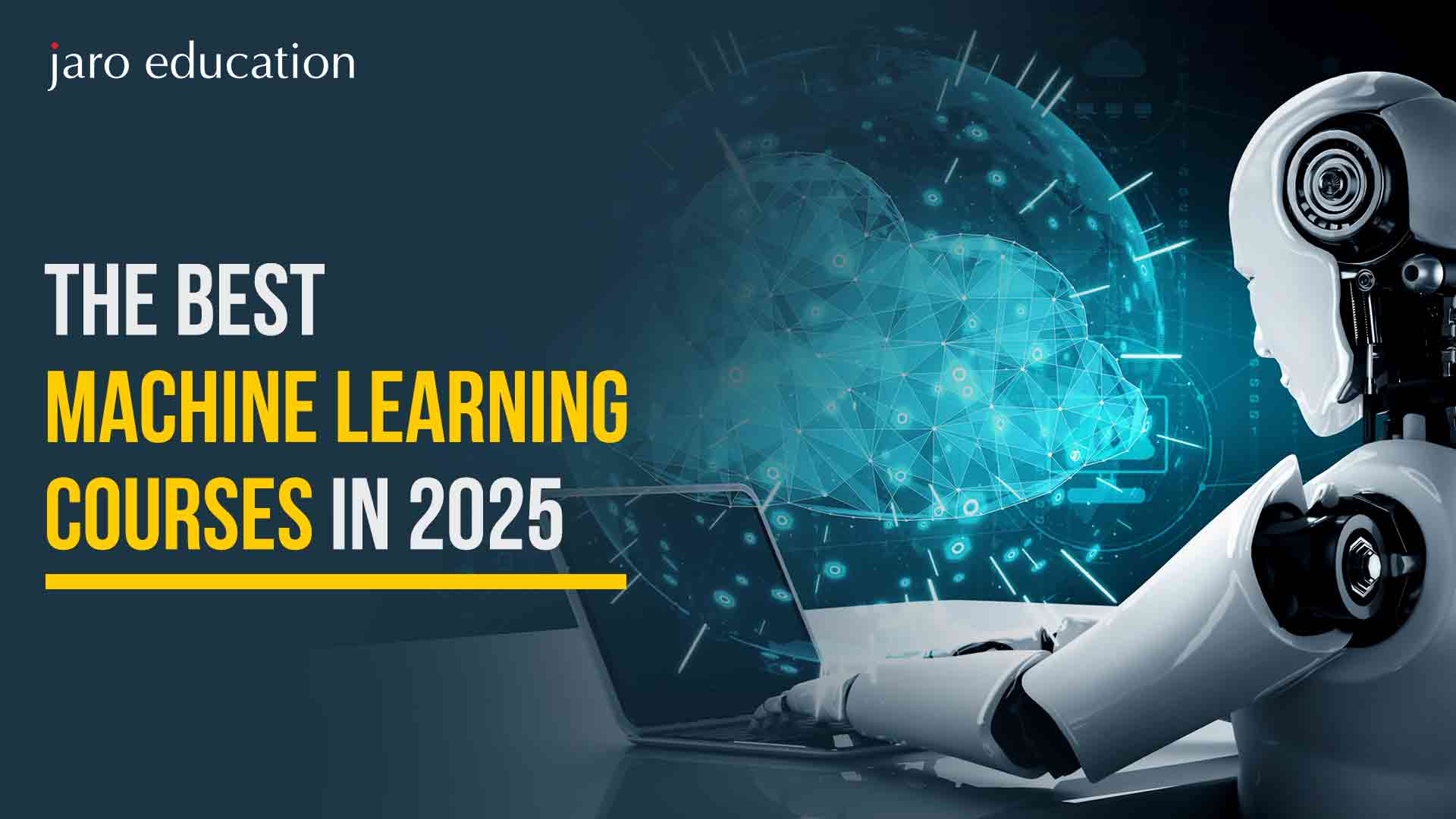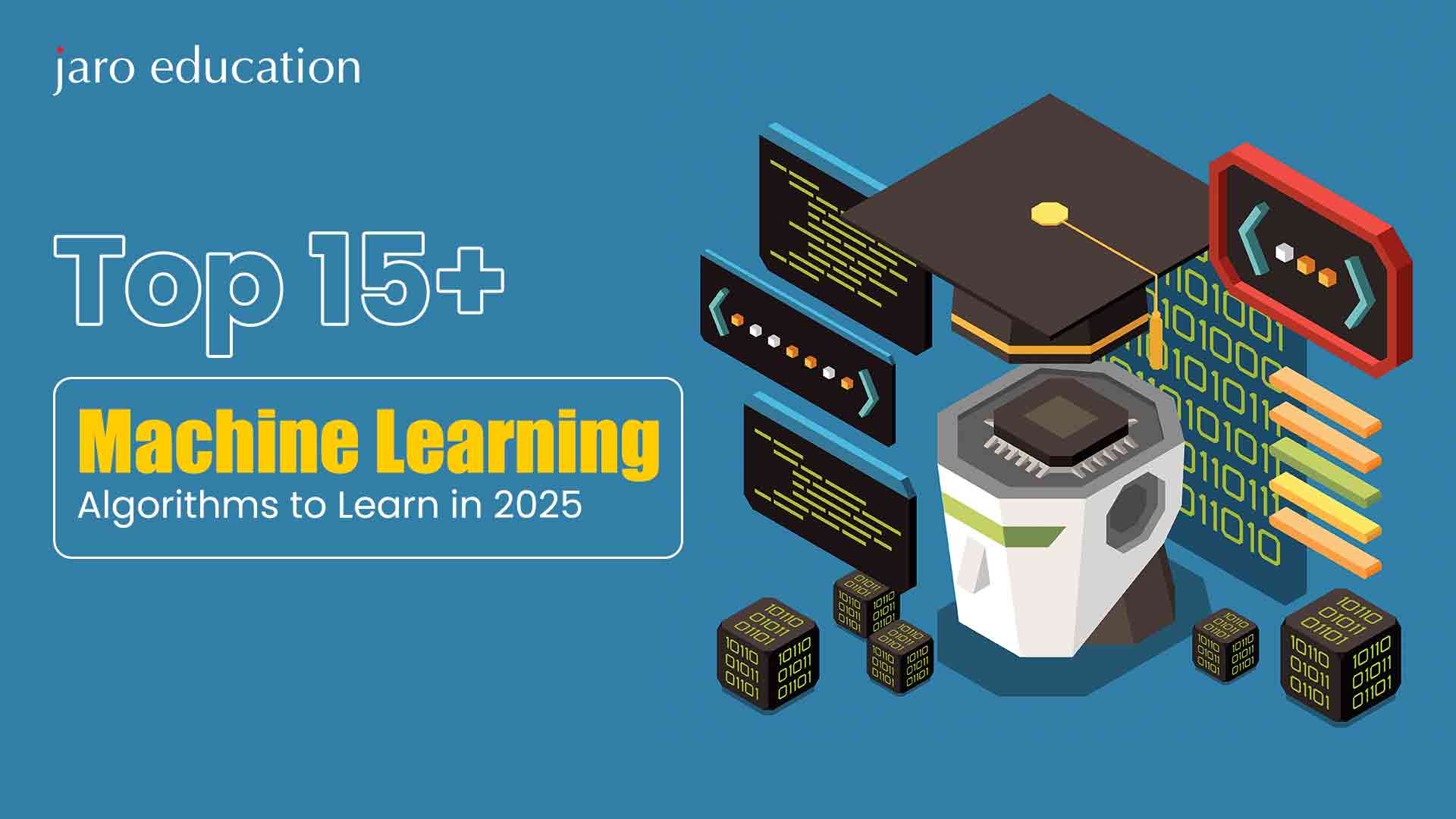Best Data Science and Machine Learning Platforms in 2025
Table of Contents
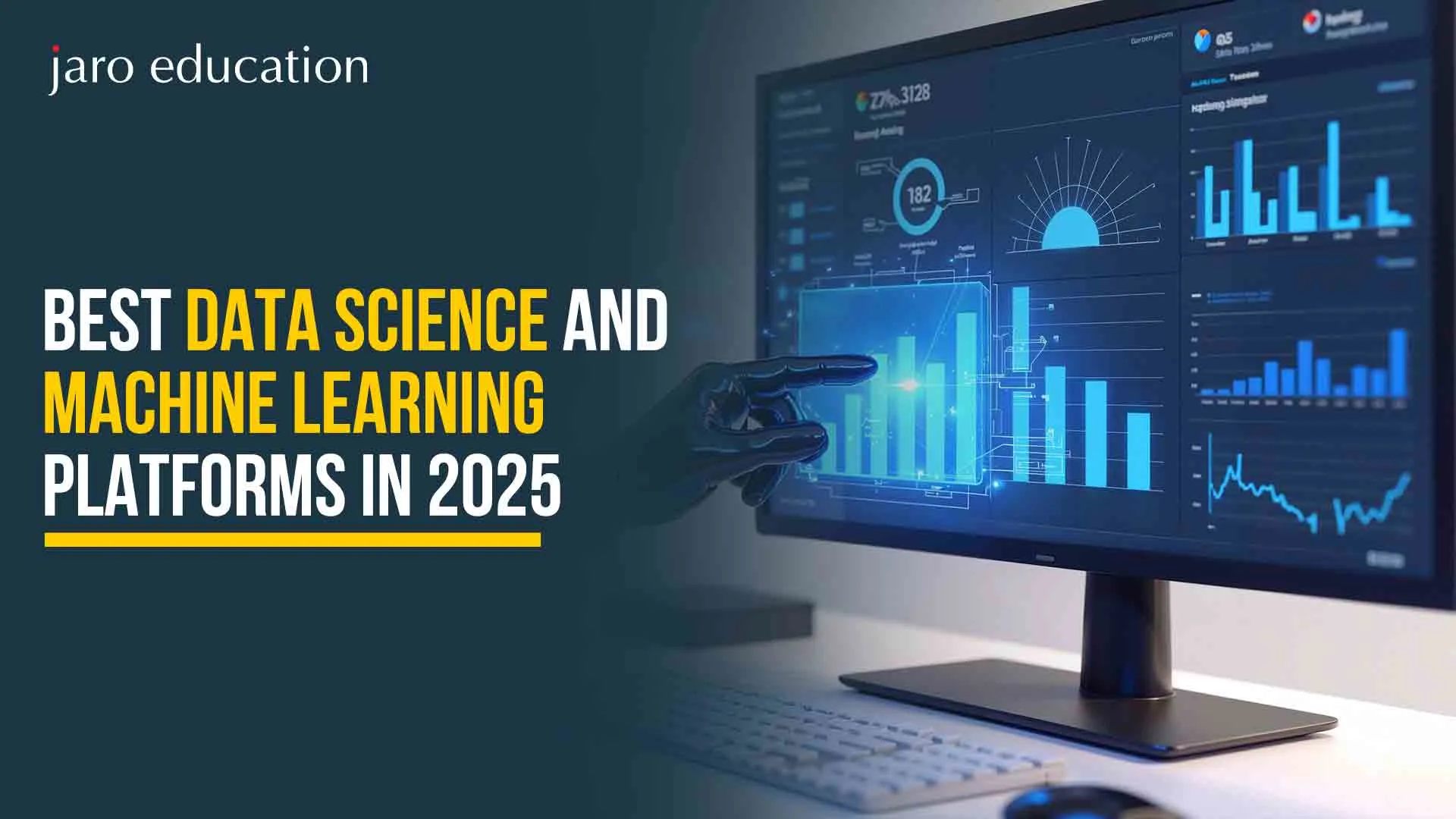
- jaro Education
- 29, March 2024
- 10:00 am
Data science and machine learning platforms have become integral in the current IT scenario. These fields of computer science are growing rapidly, and if you want to stay updated on these two crucial fields, you have to become familiar with the platforms they work on. You may find over a hundred platforms concerning these two fields, and there is no end. Each platform adopts unique attributes compatible with respective data science and machine learning projects.
Contemporary data science and machine learning platforms provide many opportunities and pave the way for eminent data scientists, machine learning experts, and deep learning professionals. With the right platform, these experts can unlock their data prospects and interpret the fast-growing IT world.
Today we are going to talk about what machine learning platforms are, how you can select one for your purpose, and learn about a few of the most famous currently available ones, such as IBM SPSS, KNIME, and DataRobot.
What Are Data Science and Machine Learning Platforms?
A data science and machine learning platform refers to software implemented by leading business organizations. This platform efficiently manages and evaluates a large chunk of data points. You can use it at various project stages, which include data collection, preprocessing, module development, and deployment. A top-notch data science platform offers a range of features, such as data preparation devices, data storage, machine learning algorithms, and visualization. The platform has all the prerequisites for teams of an organization to access multiple features to share vital project details and interact with the stakeholders.
Platform Classifications
You will find different types of data science and machine learning platforms that satisfy the specific demands of professionals at various management levels of an organization. A few of these categories are as follows:
1. Open-Source Platforms
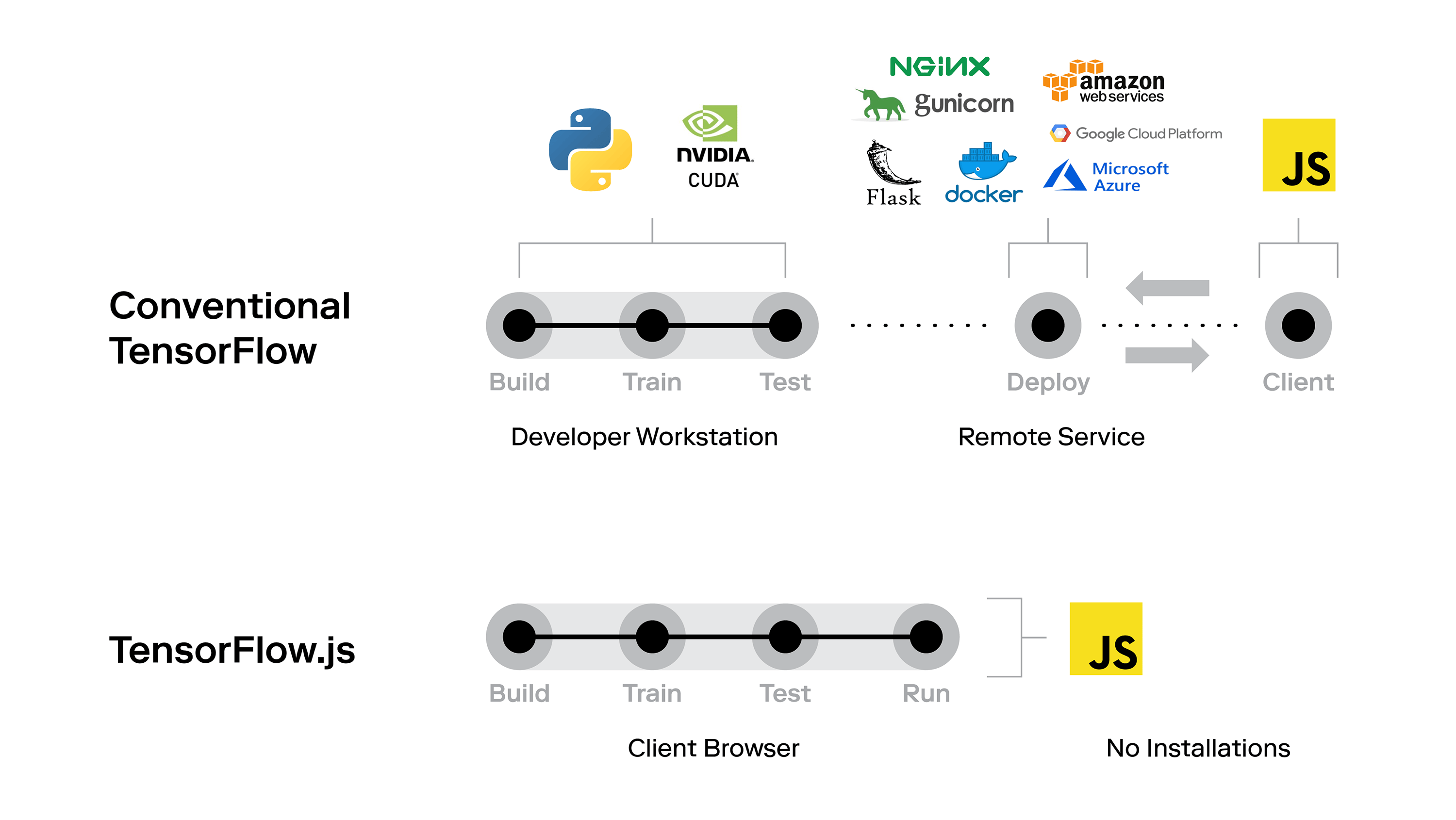
*Analytics Vidhya
These platforms enable users and developers to witness and utilize the source code, unlike platforms with limited access due to private ownership. Open-source platforms have been gaining popularity in data science and machine learning due to their open invitation to collaboration among company team members. Besides, this machine learning platform is easily customizable and enhances the scope of job opportunities for budding data scientists.
2. Cloud-Based Platforms
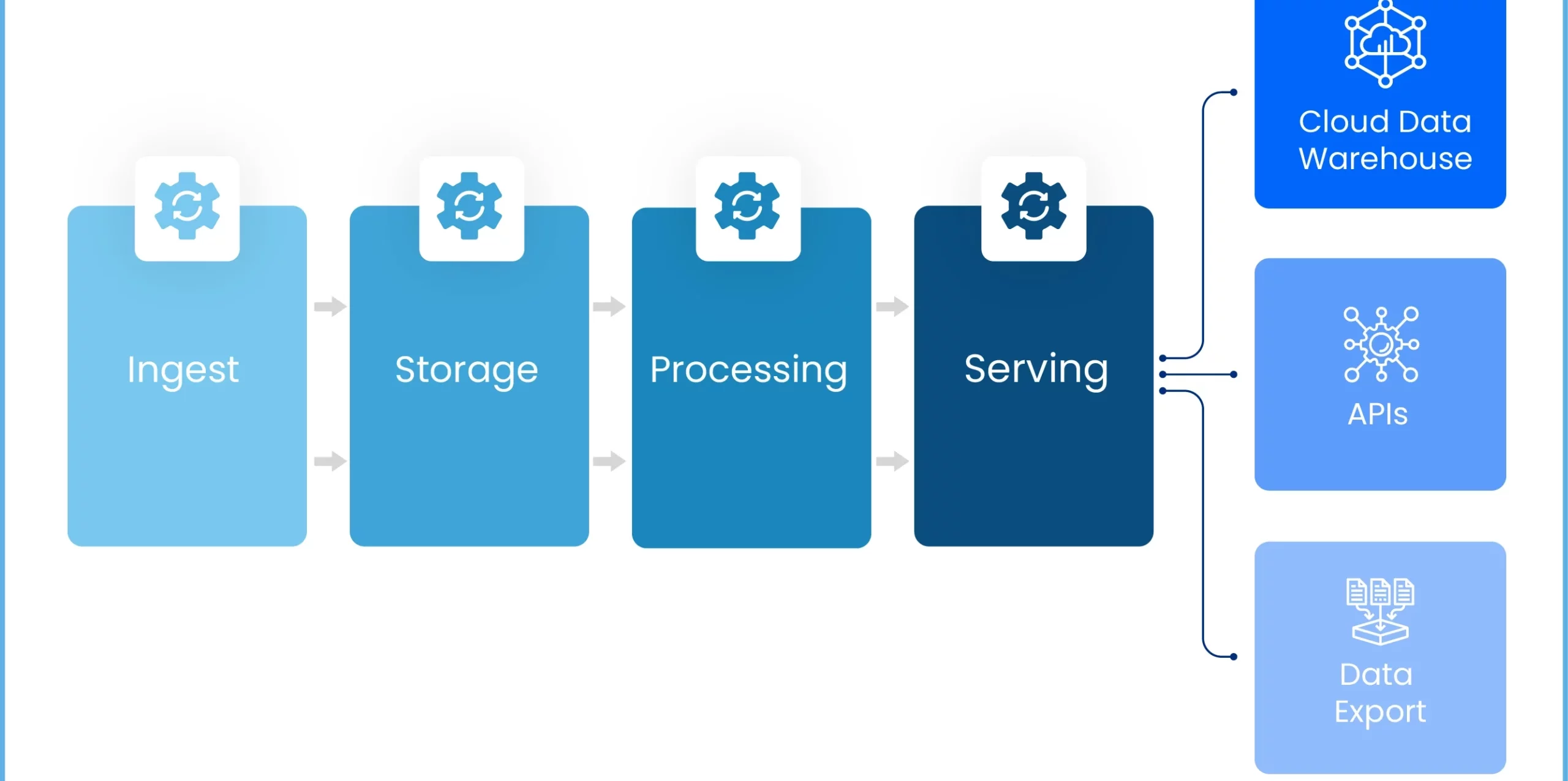
*Acceldata
Cloud computing, or a cloud-based infrastructure, caters to a multitude of online services. There are two distinct varieties: public clouds, which are open to anyone with internet access, and private clouds, which are limited to those who use exclusive networks or data centres. The primary goal of cloud-based platforms is to make them user-friendly so that professionals can access computer resources and IT services.
3. Integrated Platforms
As is evident, any commercial setup must comply with routine business operations such as selling products or services, interacting with customers, managing projects, and brand marketing. If you want specific software for each function, it may result in clutter, confusion, and unavoidable communication gaps between each stage of business operations.
Integrating data science platforms ensures that every operational software function works together instead of running individually. These platforms confirm the integration between each phase of business operations, and the development cycle rolls down without hassles.
Advantages of Using Data Science and Machine Learning Platforms
Data science signals technological development in the modern IT environment. It is because the technological revolution has triggered a massive amount of data. It pertains to the diverse spheres of social media, website personalization and, above all, the potential of online digital businesses. Find below the benefits of using data science and machine learning platforms.
- Step up Time-To-Insights
A well-received platform empowers data scientists to analyze substantial data sets skillfully, earmarking ongoing trends and patterns to expedite actionable insights.
- Encourage Decision-Making
Precise and punctual insights procured through data science and machine learning platforms assist businesses in making informed decisions, leading to superior outcomes across various organizational divisions.
- Stimulate Innovations
Data science tools and software cultivate innovations by exploring new ideas and perceptions. It has led to easy access to powerful analytical devices and ML algorithms.
- Improve Work Efficiency
An all-encompassing machine learning platform assimilates automation and workflow optimization features. These advanced features help streamline all complex and distributed business processes, saving time and eliminating manual labor.
Most Astonishing Machine Learning Platform
Included among them are IBM, SPSS, KNIME, and DataRobot.
Many machine learning libraries have emerged commercially, and each has its features and capabilities. Let’s go to a few of the market stars that include IBM, SPSS, KNIME, and DataRobot.
- Comprehensive Statistical Solution: IBM SPSS
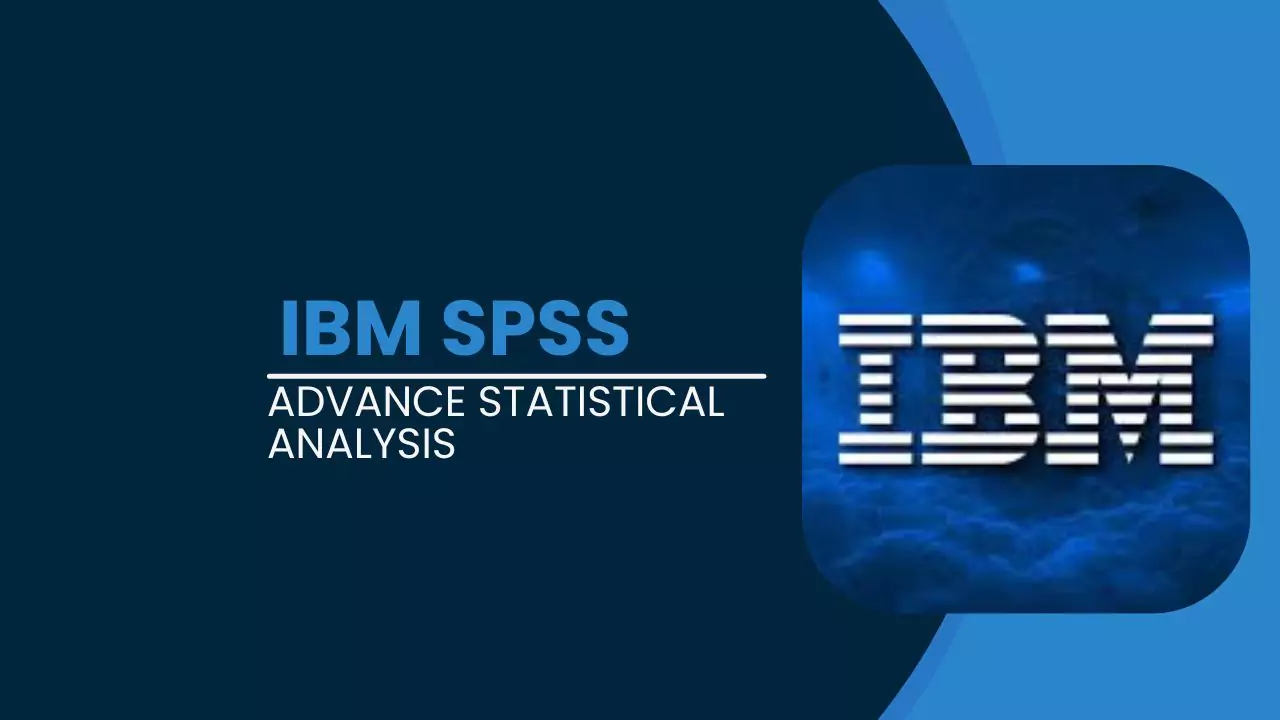
*In-depth Research
IBM SPSS offers one of the most popular services in statistical analysis and machine learning: it was defined in the first place as statistical software but entered into the definition of a complete analytic solution in terms of machine learning, predictive analytics, and data mining. Therefore, statisticians primarily focus on data analysis using statistical techniques.
Additional Points About IBM SPSS:
- User-Centric Interface: This makes it a breeze to do machine learning for almost everyone, even beginners.
- Prepackaged Algorithms: SPSS has a large collection of machine-learning algorithms, such as decision tree, neural networks, and support vector machines for supervised and unsupervised learning.
- Data Preprocessing: The comprehensive application of the cleaning, transformation, and preprocessing of data into models forms an excellent foundation for constructing machine learning models.
- Advanced Statistical Analysis: SPSS possesses advanced statistical analyses, including regression, hypothesis testing, and clustering. Thus, it is beneficial for people who possess a background in statistics.
Collaboration with Other IBM Products: Integration of IBM SPSS has been perfected with other IBM tools like Watson and IBM Cloud Pak, by using which enables much more power in the hands of users with machine learning models.
IBM SPSS is, however, known mostly as a purveyor of dedicated statistics. A machine learning platform encompasses a huge number of diverse business use cases, from fraud detection to customer segmentation and predictive maintenance.
- KNIME: Data Scientist, Open-source Platform
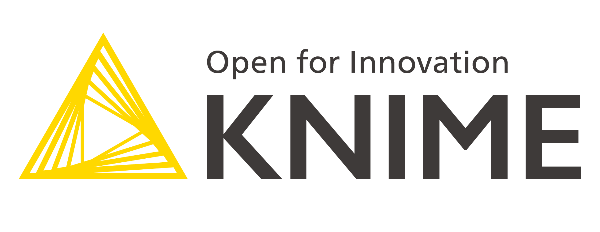
*Credly
KNIME is an open-source data analytics platform with a dynamic toolkit for building machine learning models, as well as for data mining and visualization. This flexibility and open-source nature keep it up to date and applicable for small and large-scale enterprises.
Key Features of KNIME:
- Modular System: KNIME operates on a modular system, enabling users to construct the data workflow by simply dragging and dropping components. This will make it easier to experiment with processing and modeling data techniques without writing complicated code.
- Integrations: KNIME integrates with many of the most popular machine-learning libraries, such as TensorFlow, H2O.ai, Apache Spark, etc., and the benefits of all these advanced machine-learning frameworks can be truly realized by the end-user.
- Data Preparation Tools: KNIME offers a plethora of tools for data purification, transformation, and feature engineering, thereby making the work of preparing data for modeling even lighter.
- Performance and Scale: KNIME is compatible with both local and distributed processing support, making it just as appropriate for small-scale projects as it is for enterprise-grade applications.
- Community: An open-source platform, KNIME has a very lively and large community of users and developers who constantly work on improving the same.
The above sets out what KNIME offers to data scientists and analysts. The program includes basic applications and advanced features in machine learning. It allows anyone without programming language knowledge to develop state-of-the-art, complex machine learning models using the visual workflow design.
- DataRobot Automated Machine Learning for Enterprising Applications
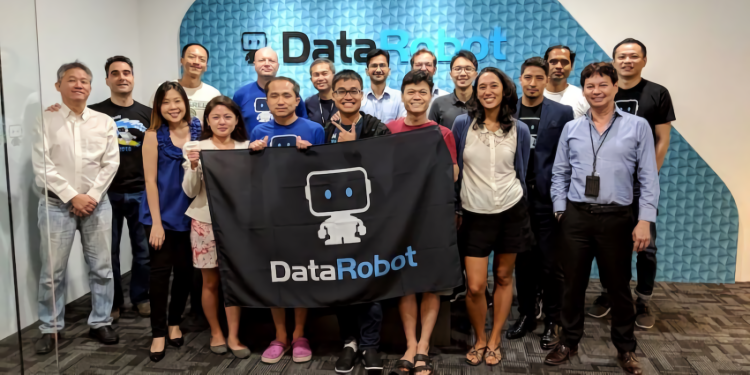
*VentureBeat
DataRobot is an automated machine learning platform that enables users to easily build and deploy machine learning models without the need for extensive knowledge about data science. It thus becomes a solution for organizations that want to scale their machine learning capabilities significantly, without having a heavy dependence on data scientists.
Core Features of DataRobot:
- Automated Model Building: DataRobot automates the selection, trains, and tunes machine learning models while analyzing the data to automatically select the best algorithm for the task. Thus, it streamlines the overall process for the users.
- Ensemble Learning: DataRobot uses ensemble learning techniques in a combination of several models that improve predictive accuracy.
- Interpretability: DataRobot outperforms all its competitors in terms of model interpretability. The clear understanding of how the model works in making predictions becomes the most indispensable one for sectors like finance, healthcare, etc.
- Big Data Tools Compatibility: In its path also comes the assimilating DataRobot with the very widely used big data-compatible applications with those of Hadoop and Spark, as well as those relying on cloud services like AWS and Google Cloud.
- Post-deployment and Monitoring: Models built using DataRobot can easily be deployed, and they can then be continuously monitored to ensure that they maintain their accuracy over time.
DataRobot is an excellent place for quick machine learning adoption by businesses without involving a lot of technical know-how. This can be useful in democratizing machine learning across many teams and departments in a business.
Some Remarkable Data Science and Machine Learning Platforms in 2025
Here are the top nine data science and machine learning platforms in 2025. This promising list encompasses platforms that are at the forefront of technology and offer productive tools for data scientists.
- Apache Spark
Apache Spark’s machine learning platform is universal and flexible and adapts well with several different programming languages. It is an exceptional tool for dealing with large and dispersed data packs. It also takes care of data frames and distinct ML algorithms from Apache. These attributes make this software convenient for data scientists pursuing machine learning and text mining courses. Apache Spark is an excellent open-source data science platform that several distinguished management professionals and computer engineers prefer.
- RStudio
RStudio is an extraordinary software popular among data scientists worldwide. It is fully compatible with the open-source programming language R and useful for Python applications. This unique tool integrates many software traits, such as RStudio Server, Desktop, Shiny Server, and other downloadable R packages. RStudio has plenty of data science packages and libraries, making it a utility open-source platform for users considering collaboration.
- RapidMiner
This unique Studio software inherits the fundamentals of predictive analytics. RapidMiner Studio is a perfect data science and machine learning tool for data scientists and business analysts, enabling them to collaborate to enhance the existing project responsibilities. Therefore, they can initiate critical changes by seeking the support of other developers working on the project.
- Microsoft’s Azure Servers
Microsoft’s Azure is a popular cloud computing platform integrating over 200 products and services into data science and machine learning activities. It is in high demand because it works in tandem with various similar tools and technologies. MS Azure servers are fast, flexible, and highly affordable for startups. Moreover, the services are available in 140 countries and 54 territories worldwide. Various modern programming languages, including Node, Java, C#, and JavaScript, are compatible with Microsoft Azure Servers.
- Saturn Cloud
Saturn Cloud serves the purpose if you ask for the most updated and contemporary data science platform for both teams and individuals. It provides precious insights and the ability to use computer programs like R, Python, and Julia on a massive scale. This distinct cloud computing app successfully exploits the strength of GPU computing to make data science assignments two thousand times faster, considerably minimizing overhead costs. With Saturn Cloud’s help, data scientists can work in a friendly and flexible environment while initiating robust notebooks, viz., RStudio, Jupyter, VS Code, and many other tools in the cloud environment.
- TensorFlow
TensorFlow is a trending and relevant machine learning platform providing data scientists with all the structures necessary to create recommendation systems, models, and varied AI applications. This software forum is ideal for stakeholders to collaborate, discover work-centric resources, exchange necessary feedback, resolve issues, and demonstrate their projects.
- Keras
It is a virtual programming interface that helps data scientists access and utilize the TensorFlow ML app more conveniently. Keras is an open-source deep learning API and system inscribed in Python that runs above TensorFlow. Keras drives rapid and simple experimentation as a top-level API requiring negligible coding compared to other deep learning methods. The objective is to quicken the implementation of ML modules in the context of deep learning neural networks. It performs this action through a development initiative with ‘high iteration velocity.’
- Matlab
Matlab is a superlative programming language and analytics environment for mathematical modeling, numerical computing, and data visualization. The primary usage belongs to data science and machine learning experts to analyze large data volumes, design ML algorithms, and create embedded frameworks for wireless communications, signal processing, industrial control, and other related applications. It works simultaneously with another tool, Simulink, that caters to model-based design and simulation attributes.
- NumPy
It is an acronym for Numerical Python and refers to an open-source Python library broadly used in scientific computing, engineering, and other critical data science and machine learning applications. The exclusive library includes a multifaceted array of objects and directions for processing those arrays to materialize numerous mathematical and logical functions. NumPy is compatible with random number generation, linear algebra, and other complex operations. The core element is ndarray (N-dimensional), which comprises items with uniform size and classification. On the other hand, a linked data-type object explains the nature of the data elements in an array, and the identical data is visible in multiple arrays.
Which Is The Best University For Data Science and Machine Learning Platform?
Have you heard about the Indian Institute of Technology Roorkee (IIT Roorkee), which is highly regarded and top-ranked among universities that offer data science courses?
You may be wondering, “Why IIT Roorkee?” We have outlined the criteria and rankings on which IIT Roorkee excels.

Post Graduate Certificate Programme in Applied Data Science & AI – IIT Roorkee
Applied data science and artificial intelligence have the capability of analyzing all kinds of real-world data types to provide actionable insights into applications such as business, economy, and society. Though, in the last few years, these skills have become important for any organization, the Indian Institute of Technology Roorkee has designed a Post Graduate Certificate Programme in Applied Data Science & AI (PGCP DSAI) to upskill working professionals to understand data science and AI fundamentals and develop hands-on experience in related software tools while equipping them to prescribe the best course of action across different applications.
Programme Highlights:
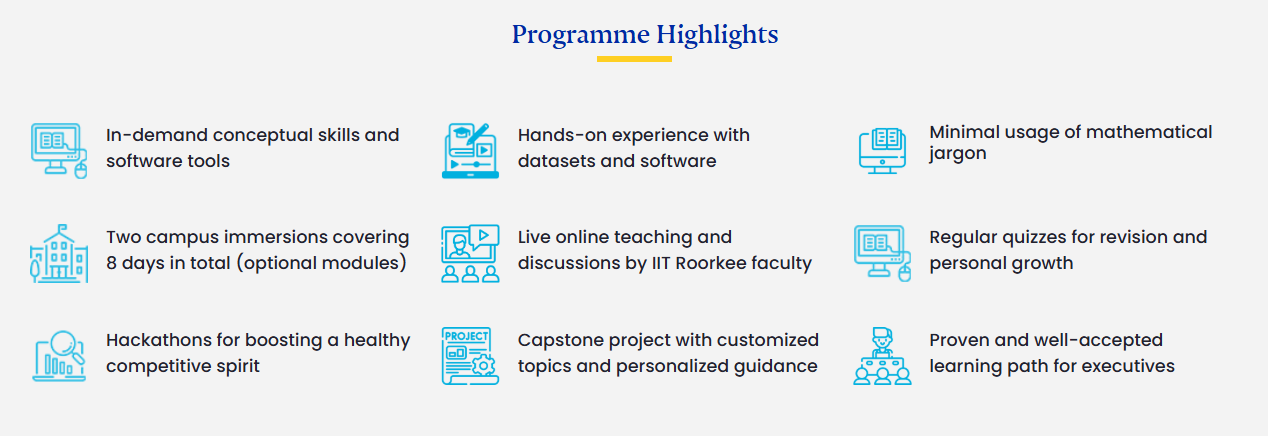
Eligibility Criteria:
An applicant who holds a bachelor’s degree (or equivalent) from any recognized university is eligible for admission to the program if he/she has obtained 50% marks in aggregate at the undergraduate level. Work experience of one year shall be preferred after the qualifying degree is completed.
Jaro Education has been catering to the students and professionals’ careers for a very long time. So, do not miss the opportunity to take the seat and book the best counselling and guidance.
Jaro Education Career Counseling Benefits
- Personalized Counsel and Solutions
Thus, Jaro Education would like to communicate that every person is unique by offering individualistic career counselling services. All advice and counseling will be tailored specifically to the skills, goals, and dreams of the client, making such interventions very relevant and logical.
- Indubitably Known Experts in Scope
Jaro Education employs experienced professionals who have spent many years providing career counseling and engaging in human resource needs for different clients. Their pool of experts possesses enormous knowledge in diverse industries and is in an excellent position to provide insight into the best career paths and strategies for growth.
- End-to-End Career Guidance
Contrary to generic career counseling services, Jaro Education boasts a truly end-to-end career counseling process, beginning with skill-building and educational planning, going through resume writing and interview guidance, and leading to career assistance. This system therefore prepares you for whatever challenges you might face.
- Support for Student and Professional
Therefore, Jaro Education caters to both students in their early career stages and experienced professionals who are seeking a career change or corporate ladder ascent. It would also offer all these people career counseling services that are much more flexible, such that they cover the needs as well as concerns for all levels of the career journey.
- Reach Out to Many Resources
Jaro Education also extends one of the widest ranges of resources, such as webinars, workshops, skill-building programs, etc. Taken together, this opens worlds of knowledge and skills development for users and keeps them updated with the freshest trends in their respective courses.
Conclusion
As modern enterprises have become digital, most business decisions revolve around large data sets, so it is crucial to gauge various data science and machine learning tools and devices available in the global market to stay competitive. Each data science software has unique traits and works for separate teams of users. Therefore, you must determine whether you implement open-source, cloud-based, or integrated platforms. Examining your organization’s requirements is pertinent as a professional at different management levels. It also enables you to opt for a platform that supports your problem statement and prompt decision-making.
Lastly, don’t be afraid to explore and research as you proceed with your data science projects. During the journey, you will learn sufficiently about the different platforms and their inherent features. Selecting the appropriate platform can simplify the process of data science and machine learning. Now, you can learn powerful tools without hassles, revolutionize the process, and analyze and optimize the given data.
Frequently Asked Questions
A data science platform is a suite of tools and technologies designed to assist data scientists and analysts in performing data analysis, building models, and deploying data-driven solutions. These platforms typically provide access to various data manipulation tools, machine learning algorithms, visualization tools, and collaboration features to streamline the data science workflow.
A machine learning platform is a specialized software solution that helps organizations develop, deploy, and manage machine learning models. These platforms typically provide tools for data preparation, model training, testing, and optimization, allowing both data scientists and non-technical users to build machine learning applications. Examples of machine learning platforms include TensorFlow, IBM Watson, and Google Cloud AI.
While both types of platforms deal with data and analytics, Data Science Platforms focus on the overall data analysis process, including data cleaning, visualization, and reporting. They also support statistical analysis and advanced techniques, like machine learning. Machine learning platforms, on the other hand, are more focused on building and deploying machine learning models and optimizing algorithms for predictive analytics and decision-making.
Key features of a data science platform include:
- The system provides data integration and storage capabilities.
- Data preparation and cleaning tools.
- Visualization tools for creating reports and dashboards.
- Collaboration features for teams.
- Support for various machine learning and statistical libraries.
- Integration with cloud platforms for scalability.




